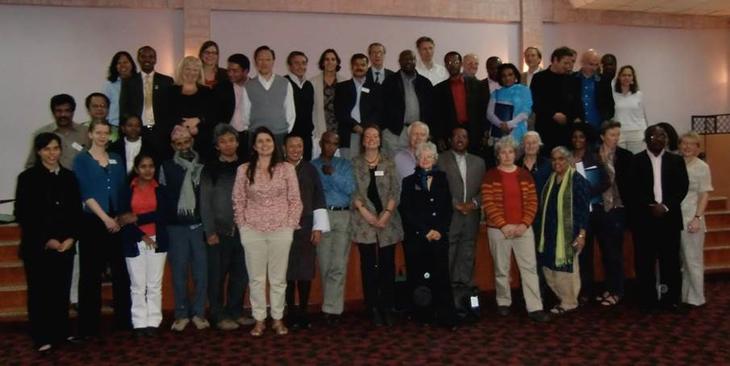
2009 – 2011: The Addis Ababa Global Consultations on Farmers’ Rights
In this biennium, the most important activities were the Global Consultations on Farmers’ Rights. A first part was e-mail-based and reached out to all regions and stakeholder groups. The second part was a conference in Addis Ababa, with regional elements. A total of 160 stakeholders were consulted.
In the inter-sessional period 2009 – 2011, global consultations were carried out. The background was a decision made by the Governing Body of the Plant Treaty at its third session (Resolution 6/2009 (PDF)). Here the Governing Body recalls the importance of fully implementing Farmers' Rights, and requests the Secretariat to convene regional workshops on Farmers' Rights to discuss relevant national experiences.
The Fridtjof Nansen Institute in Norway assisted the Secretariat in carrying out this task. The consultation process started with a survey to stakeholders in all regions, in order to involve as many stakeholders as possible. By the deadline, 56 questionnaires from 108 respondents had been received. These were analyzed, and a preliminary report produced, presenting the results.
A global consultation conference, with regional components and 52 participants representing a wide range of stakeholders and countries, took place in Addis Ababa 23 25 November 2010. The conference was organized by the Fridtjof Nansen Institute, Norway, and hosted by the Institute of Biodiversity Conservation, Ethiopia (now Ethiopian Biodiversity Institute).
Among the recommendations resulting from these consultations were the following (selection):
- Noting the valuable contributions of the Voluntary Guidelines on the Right to Food, the Governing Body should in particular establish an ad hoc working group to develop voluntary guidelines on the national implementation of Article 9 and related provisions, in a transparent, participatory and inclusive manner, with the effective involvement of farmers‟ organizations and other relevant organizations. The voluntary guidelines should assist and support national governments in implementing farmers rights.
- National governments should consider Article 9.3 broadly, with particular regard to the fact that the factors involved in determining how to recognize these rights are not purely scientific and that these rights have implications for farmers’ livelihoods and other social, economic and environmental issues.
- Formal and local seed systems should not be seen as in opposition but should be recognized as complementary and, as such, there is a need to ensure legal space for each to make its contribution to the conservation and sustainable use of PGRFA at the national level.
- National governments should protect and promote, as a matter of urgency, traditional knowledge that is relevant to PGRFA; recognizing its dynamic nature and the need for a holistic approach that considers factors including livelihoods, cultures and places.
- National governments should, including through their Focal Points, actively: promote farmers ‘access to PGRFA, including material under the Multilateral System; assist farmers and farmers’ organizations in formulating and submitting proposals to the benefit-sharing fund of the Treaty.
- In allocating funds and formulating national policies relating to agricultural biodiversity, national governments should promote equality between formal scientific and local community knowledge.
- National governments are encouraged to involve farmers in the reviews provided for in Article 6.2(g) and in decision-making on breeding strategies and the regulation of variety release and registration.
- In addition to the recommendations above, in the realization of Farmers‟ Rights, national governments should concentrate on capacity-building and the promotion of awareness, including: the complementary nature of formal and local seed systems; the provision of information related to the Treaty; how types of farmer participation affect decision-making.
The results of the global consultation process were presented in two reports. The first report (FNI Report 1/2011 (PDF) (1MB)) presented the proceedings of the Consultation Conference, and contains a summary of the findings from the email-based questionnaire survey, while the second report (FNI Report 2/2011 (PDF)) presented the findings from the survey more in detail. A summary of the results and recommendations were presented in an input paper (PDF) (149KB) (available also in Spanish (PDF) (154KB) and French (PDF) (260KB)) submitted by Ethiopia to the Governing Body of the Plant Treaty at its Fourth Session in 2011, as a basis for an agenda item on Farmers' Rights. Moreover, the results were presented at a side event during that Fourth Session of the Governing Body. The side event was organized by the Fridtjof Nansen Institute (FNI), Norway, in co-operation with the Institute for Biodiversity Conservation, Ethiopia (now Ethiopian Biodiversity Institute), and was well attended, with 60 participants.
The consultations was made possible with the financial support of the Norwegian Agency for Development Cooperation (NORAD), the Swedish International Biodiversity Programme (SwedBio), the Norwegian Ministry of Agriculture and Food and the Development Fund, Norway, while Ethiopia, through Institute of Biodiversity Conservation (IBC, now EBI), offered to host the consultation conference.